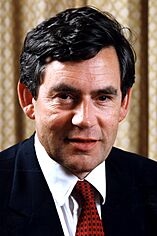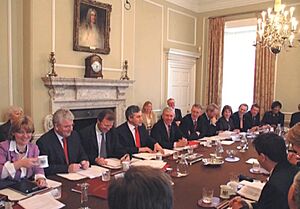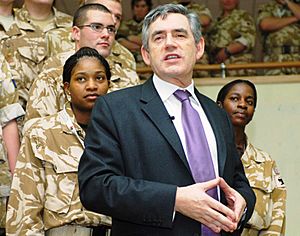Gordon Brown facts for kids
Quick facts for kids
Gordon Brown
|
|||||||||||||
|---|---|---|---|---|---|---|---|---|---|---|---|---|---|
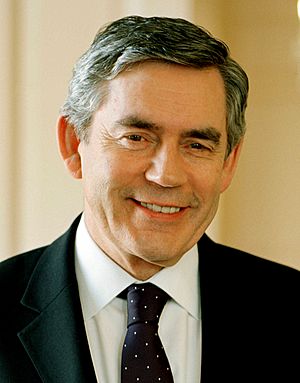
Official portrait, c. 2008
|
|||||||||||||
| Prime Minister of the United Kingdom | |||||||||||||
| In office 27 June 2007 – 11 May 2010 |
|||||||||||||
| Monarch | Elizabeth II | ||||||||||||
| First Secretary | The Lord Mandelson (2009–2010) | ||||||||||||
| Preceded by | Tony Blair | ||||||||||||
| Succeeded by | David Cameron | ||||||||||||
| World Health Organization Ambassador for Global Health Financing | |||||||||||||
| Assumed office 20 September 2021 |
|||||||||||||
| Director-General | Tedros Adhanom Ghebreyesus | ||||||||||||
| Preceded by | Office established | ||||||||||||
| United Nations Special Envoy for Global Education | |||||||||||||
| Assumed office 13 July 2012 |
|||||||||||||
| Secretary-General | Ban Ki-moon António Guterres |
||||||||||||
| Preceded by | Office established | ||||||||||||
| Leader of the Labour Party | |||||||||||||
| In office 24 June 2007 – 11 May 2010 |
|||||||||||||
| Deputy | Harriet Harman | ||||||||||||
| Preceded by | Tony Blair | ||||||||||||
| Succeeded by | Ed Miliband | ||||||||||||
| Chancellor of the Exchequer | |||||||||||||
| In office 2 May 1997 – 27 June 2007 |
|||||||||||||
| Prime Minister | Tony Blair | ||||||||||||
| Preceded by | Kenneth Clarke | ||||||||||||
| Succeeded by | Alistair Darling | ||||||||||||
|
|||||||||||||
| Member of Parliament for Kirkcaldy and Cowdenbeath |
|||||||||||||
| In office 9 June 1983 – 30 March 2015 |
|||||||||||||
| Preceded by | Constituency established | ||||||||||||
| Succeeded by | Roger Mullin | ||||||||||||
| Personal details | |||||||||||||
| Born |
James Gordon Brown
20 February 1951 Giffnock, Renfrewshire, Scotland |
||||||||||||
| Political party | Labour | ||||||||||||
| Spouse | |||||||||||||
| Children | 3 | ||||||||||||
| Education | University of Edinburgh (MA, PhD) | ||||||||||||
| Signature | |||||||||||||
James Gordon Brown (born 20 February 1951) is a British politician. He served as Prime Minister of the United Kingdom and Leader of the Labour Party from 2007 to 2010. Before that, he was the Chancellor of the Exchequer from 1997 to 2007 under Prime Minister Tony Blair.
Brown was a Member of Parliament (MP) for different areas from 1983 to 2015. After leaving Parliament, he took on important global roles. Since 2012, he has been the United Nations Special Envoy for Global Education. In 2021, he was also named the World Health Organization Ambassador for Global Health Financing.
Brown studied history at the University of Edinburgh, earning a PhD. He worked as a lecturer and a television journalist before becoming an MP. As Chancellor, he made big changes to how Britain's economy was managed. He gave the Bank of England more control over interest rates. His time as Chancellor saw a long period of economic growth in Britain. He also decided that the UK would not join the euro currency.
When Tony Blair resigned in 2007, Brown became Prime Minister. His government faced the 2008 financial crisis. They introduced plans to help banks and the economy. During his time, the government also passed the world's first Climate Change Act and the Equality Act 2010. After the 2010 general election, Labour lost many seats, and Brown resigned. He was succeeded by David Cameron.
After leaving office, Brown continued as an MP until 2015. He played a big part in the campaign for Scotland to remain part of the United Kingdom in the 2014 Scottish independence referendum. He has also written books and continued his work with the UN and WHO. In 2024, he received the Order of the Companions of Honour for his public and charity work.
Contents
Early Life and Education
James Gordon Brown was born in Giffnock, Scotland. His father, John Ebenezer Brown, was a minister of the Church of Scotland. His mother was Jessie Elizabeth Brown. The family moved to Kirkcaldy when Gordon was three years old. He grew up there with his two brothers, John and Andrew.
School and University Years
Brown went to Kirkcaldy West Primary School. He then attended Kirkcaldy High School, where he was part of a special program that allowed him to go to university early. At 16, he started studying history at the University of Edinburgh.
During a rugby game, he had an accident that left him blind in his left eye. Later, he had another eye problem, but doctors saved the sight in his right eye. He graduated from Edinburgh in 1972 with a top degree in history. He then continued his studies and earned a PhD in history in 1982. While at university, he was elected Rector of the University of Edinburgh, a student representative role.
Before Becoming an MP
From 1976 to 1980, Brown taught politics at Glasgow College of Technology. He also worked as a tutor for the Open University. In 1979, he tried to become an MP but did not win.
From 1980, he worked as a journalist at Scottish Television. He became a current affairs editor before being elected to Parliament in 1983.
Joining Parliament and Opposition Work
Brown was elected to Parliament as a Labour MP in 1983 for Dunfermline East. His first office mate in Parliament was Tony Blair, who would later become Prime Minister. Brown became a spokesman for Trade and Industry in 1985.
He then joined the Labour Party's "Shadow Cabinet" in 1989. This is a group of opposition MPs who challenge the government. He became the Shadow Chancellor of the Exchequer in 1992. This meant he was the main opposition spokesperson on economic matters.
After the Labour leader, John Smith, passed away in 1994, Tony Blair became the new leader. Brown and Blair had a close working relationship. It was believed they had an agreement that Brown would be in charge of economic policy if Labour won the next election.
Chancellor of the Exchequer (1997–2007)
In the 1997 general election, Labour won by a large amount, ending 18 years of Conservative government. Tony Blair became Prime Minister and appointed Gordon Brown as Chancellor of the Exchequer. Brown held this job for over 10 years, making him the longest-serving Chancellor in modern history.
Key Economic Changes
One of Brown's first big decisions as Chancellor was to give the Bank of England independence in setting interest rates. This meant the Bank, not politicians, would decide how much it cost to borrow money. He also moved responsibility for checking on banks to a new body called the Financial Services Authority.
Taxes and Spending
During his time as Chancellor, Brown promised not to raise the main rates of income tax. He actually lowered the basic rate from 23% to 20%. He also reduced corporation tax for businesses. In 1999, he introduced a lower 10% income tax band, but he removed it in his last budget in 2007. This change affected some people's taxes.
Brown also introduced a "Windfall Tax" on privatized utility companies. This tax brought in about £5 billion for the government. This money was used to fund a program called the "New Deal for Young People," which helped young people find jobs.
Government spending, especially on health and education, increased a lot under Brown. He also introduced working tax credits to help families.
The Euro Currency
In 1997, Brown set out "five economic tests" to decide if the United Kingdom should adopt the euro, the single European currency. In 2003, the Treasury decided that the UK had not passed these tests, meaning the country would not join the euro.
Other Important Decisions
Between 1999 and 2002, Brown sold a large part of the UK's gold reserves. This decision was later criticized because the price of gold went up a lot after the sale. The government's reason was to spread out the UK's investments.
Brown also worked to reduce the debt of poorer countries around the world.
Becoming Labour Leader
After Tony Blair announced he would step down, Gordon Brown was the clear favorite to become the next Labour leader. On 11 May 2007, Brown officially announced he wanted the job. He received enough support from MPs to become leader without a contest. He officially became Leader of the Labour Party on 24 June 2007.
Prime Minister (2007–2010)
On 27 June 2007, Gordon Brown became Prime Minister after Tony Blair resigned. In his first speech, Brown said he would lead "a new government with new priorities."
Brown made some changes to policies from Blair's time. He kept strong ties with the United States and continued the war in Iraq, but he also started an inquiry into why Britain joined the conflict. He appointed Jacqui Smith as the UK's first female Home Secretary. He also suggested giving Parliament more power over decisions like declaring war.
There was talk in 2007 about whether Brown would call an early general election, as polls showed he might win. However, he decided not to, and his popularity later dropped.
Domestic Policies
As Prime Minister, Brown proposed several new policies. He wanted to make government more open and set clear rules for ministers. He also aimed to give Parliament more power and balance power between the central government and local councils. He said Parliament should have the final say on sending British troops into action.
He also wanted to improve public services. For example, he suggested that doctors' offices should be open on weekends and evenings. Brown also spoke about "British Jobs for British workers," which caused some debate because of EU laws on workers' rights.
Foreign Policies
Brown was committed to the Iraq War but said he would "learn the lessons" from mistakes made there. He announced an inquiry into the war in 2008.
He emphasized the "special relationship" between Britain and the United States, saying they shared important values. Brown did not attend the opening ceremony of the 2008 Summer Olympics in Beijing, but he did attend the closing ceremony.
Global Financial Crisis
Brown's time as Prime Minister happened during the Great Recession, a major global economic downturn. His government introduced a large plan to help banks and the economy, including a temporary cut in value-added tax. The government took ownership stakes in some banks that were in trouble.
Challenges to Leadership
During 2008 and 2009, some MPs openly questioned Brown's leadership. There were calls for him to resign, but many of his ministers supported him. In 2009, James Purnell resigned from the Cabinet and called for Brown to step down. In early 2010, two other MPs also called for a secret vote on his leadership, but this idea did not gain much support.
Elections and Resignation
In local elections in 2008 and 2009, Labour had poor results. In the 2009 European elections, Labour finished third. These results were some of the worst for the party since World War II.
In April 2010, Brown called a general election. The election resulted in a "hung parliament," meaning no single party won enough seats to form a government on its own. Brown resigned as Prime Minister on 11 May 2010. He also stepped down as leader of the Labour Party. David Cameron became the new Prime Minister, leading a coalition government.
After Being Prime Minister (2010–Present)
After leaving 10 Downing Street, Brown continued to serve as an MP for his local area, Kirkcaldy and Cowdenbeath, until 2015.
He wrote a book called Beyond the Crash, which discussed the 2008 financial crisis and his ideas for global action.
Brown played a very important role in the 2014 Scottish independence referendum. He strongly campaigned for Scotland to remain part of the United Kingdom, giving passionate speeches about sharing and cooperation.
On 1 December 2014, Brown announced he would not seek re-election and stepped down as an MP in May 2015.
International Roles

In 2010, Brown was invited to join the board of directors for the World Wide Web Foundation. He also became an unpaid advisor at the World Economic Forum.
In July 2012, the UN Secretary-General named Brown the United Nations Special Envoy for Global Education. This role is unpaid and focuses on improving education worldwide.
In September 2021, the World Health Organization appointed Brown as their Goodwill Ambassador for Global Health Financing.
Recent Work
In December 2015, Brown took on his first major role in the private sector, becoming an advisor to PIMCO, an investment company. Any money he earns from this role goes to the Gordon and Sarah Brown Foundation, which supports charity work.
He released his memoir, My Life, Our Times, in 2017. In 2021, he published Seven Ways to Change the World: How To Fix The Most Pressing Problems We Face.
In 2022, Brown led the development of new ideas for how the Labour Party could reform the UK's constitution. These ideas included changing the House of Lords to an "Assembly of the Nations and Regions" with elected members.
In 2023, Brown co-wrote the book Permacrisis: A Plan to Fix a Fractured World. In 2024, he co-authored a report on child poverty, calling for more support to help children in need.
Personal Life
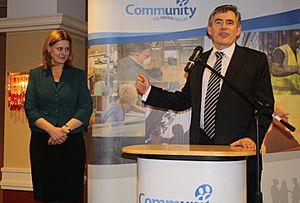
Gordon Brown married Sarah Macaulay in 2000. They had a daughter, Jennifer Jane, who sadly died shortly after birth in 2002. They have two sons, John Macaulay (born 2003) and James Fraser (born 2006). In 2006, Fraser was diagnosed with cystic fibrosis.
Sarah Brown became more visible in public life after 2008, often introducing her husband at events. She is also involved with several charities.
Brown is a supporter of the NHS (National Health Service). This is partly because of the excellent care he received for his eye injury and the care his family received when their daughter was born. He is also a fan of the football club Raith Rovers.
Religion
As the son of a Church of Scotland minister, Brown has often spoken about his "moral compass" and how his parents inspired him. He is a member of the Church of Scotland.
Honours and Awards
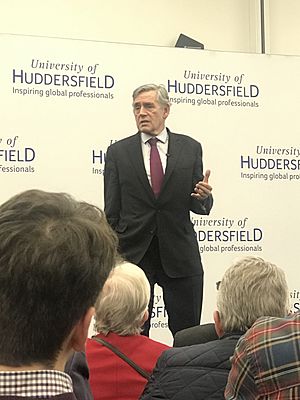
Gordon Brown has received many honorary degrees from universities, including:
- Brunel University (1996)
- University of Edinburgh (2003)
- Robert Gordon University (2003)
- New York University (2005)
- Newcastle University (2007)
- University of Delhi (2008)
- University of Glasgow (2015)
In 2018, he was made an Honorary Fellow of the Royal Society of Edinburgh.
In 2009, he was named "World Statesman of the Year" by the Appeal of Conscience Foundation, an American group that promotes peace and human rights. He has also won several awards at the Scottish Politician of the Year awards, including "Best Scot at Westminster" multiple times.
In 2024, King Charles III appointed him a Member of the Order of the Companions of Honour for his public and charity work in the UK and around the world.
See also
 In Spanish: Gordon Brown para niños
In Spanish: Gordon Brown para niños
- Brownism
 | Jessica Watkins |
 | Robert Henry Lawrence Jr. |
 | Mae Jemison |
 | Sian Proctor |
 | Guion Bluford |


